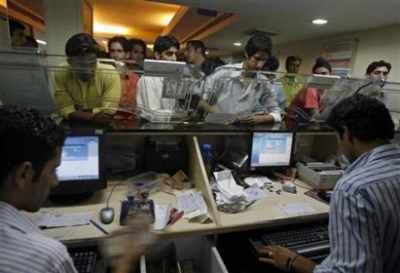'At this point, it does not appear to be a Lehman Brothers kind of crisis, which had a domino effect on the financial system.'
 Nirmal Jain, chairman and founder of the IIFL Group, spoke to Rajesh Bhayani on the impact of Britain voting to exit the European Union on Indian markets.
Nirmal Jain, chairman and founder of the IIFL Group, spoke to Rajesh Bhayani on the impact of Britain voting to exit the European Union on Indian markets.
The process of free trade and globalisation has not ended, he says, and markets will start tracking earnings growth in the medium to long run.
Edited excerpts:
How long will Brexit haunt Indian markets and how far could they fall in the near term?
I think the impact will be over in a few days, unless there are other disturbing developments like more countries leaving the EU or some funds or financial institutions going bust due to currency or market volatility.
Fears about Brexit are exaggerated. At this point, it does not appear to be a Lehman Brothers kind of crisis, which had a domino effect on the financial system.
For Indian markets, watch global developments in the wake of Brexit, along with the monsoon, inflation, economic growth, industrial production and reforms.
In the near term, the market will remain range-bound and will follow fundamentals and corporate earnings in the long term.
The general perception is that Brexit will slow down the EU as well as global economies. How can Indian companies grow in that scenario?
The immediate impact of Brexit will be on the UK, where entrepreneurs might hold back new investments, leading to slow growth.
But, I am sure the UK will find ways to mitigate the damage. The underlying factors for Brexit were political and not economic.
People wanted to vote against immigration and not against free trade.
The UK might negotiate trade agreements with the other EU countries, as Norway and Switzerland have done.
Although other EU countries may negotiate hard to make up for immigration policy, the UK does have most favoured nation (MFN) status and will not have a duty regime more adverse than non-EU countries.
It is not a reversal of free trade or end of globalisation. Large economies outside the EU also have been making cross-border investments and easing trade rules under the framework of the World Trade Organization, and through bilateral treaties.
The P/E ratio of the Indian market is high and India is highly exposed to trade with the EU. Will it not be a hurdle for companies exposed to that area to grow?
The PE of the Indian market has traditionally been higher, reflecting expectations of earnings growth, as well as superior quality of earnings.
India is the fastest growing economy in the world. Our economy is hugely domestic-oriented and vulnerability to the EU turmoil is not significant.
The Brexit process will take at least two years and many new scenarios will emerge in the interim.
The impact will be only on a handful of Indian companies; most of them and the economy will be unscathed.
Which sectors and companies should investors enter and exit in the current scenario?
Only a few companies that are impacted directly, those with large exposure to the UK and the European Union, may be affected in the short term.
You can build a portfolio across sectors and companies and can look at stocks from a bottom-up approach of fundamentals and valuations.
One need not worry about the broader Indian market.
What are your expectations from the June quarter results? The effect of Brexit might be seen in coming quarters. Does that mean earnings have peaked?
The June quarter results will show slow recovery and corporate results will be a mixed bag.
I do not see a significant impact of Brexit on corporate earnings in the coming quarters. It will impact only a handful of companies.
I think corporate earnings growth will start rebounding from the second half of the financial year and end the year with double-digit growth.
Earnings growth can accelerate to 15-18 per cent in 2017-18.
Longer term markets will follow the earnings growth trajectory.
The rupee is weakening and FCNR redemption may further exert pressure. Will it delay foreign inflows into the Indian market?
A minor correction in the rupee cannot be termed a weakening.
Rather, one should be reassured of Indian economy's inherent strength because of the rupee's resilience in such an extraordinary event.
Also, the government and the Reserve Bank of India are well prepared for FCNR redemptions.
Foreign portfolio investment flow to India will continue to be driven by India's strong as well as improving fundamentals.
Photograph: Reuters












 © 2025
© 2025